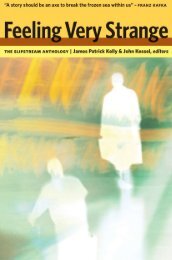The Curse of the Wer.. - Site de Thomas - Free
The Curse of the Wer.. - Site de Thomas - Free
The Curse of the Wer.. - Site de Thomas - Free
Create successful ePaper yourself
Turn your PDF publications into a flip-book with our unique Google optimized e-Paper software.
12 THE CURSE OF THE WEREWOLF<br />
<strong>The</strong> werewolf already had a rich documentary history in Western<br />
literature prior to <strong>the</strong> nineteenth century. <strong>The</strong> ancient myth <strong>of</strong> Lycaon<br />
is one <strong>of</strong> <strong>the</strong> earliest accounts <strong>of</strong> <strong>the</strong> metamorphosis <strong>of</strong> a human being<br />
into a wolf; recounted by Pausanius and Appollodorus (both Greek<br />
writers <strong>of</strong> <strong>the</strong> second century AD) and more famously in Ovid’s Metamorphoses,<br />
it features Zeus transforming <strong>the</strong> King <strong>of</strong> Arcadia into<br />
a wolf as punishment for serving a meal <strong>of</strong> human flesh. <strong>The</strong> first<br />
exten<strong>de</strong>d use <strong>of</strong> <strong>the</strong> werewolf in a work <strong>of</strong> fiction appeared in a comedy<br />
entitled Satyricon, written in <strong>the</strong> first century AD by <strong>the</strong> Roman author<br />
Petronius Arbiter, in which a man looks on in horror as an acquaintance<br />
strips <strong>of</strong>f his clo<strong>the</strong>s and runs away in <strong>the</strong> form <strong>of</strong> a wolf. References<br />
to lycanthropy also appeared in early Western literature in <strong>the</strong> work <strong>of</strong><br />
poets, travel writers, mythographers, historians and physicians; Paulus<br />
Aegineta’s seventh-century cyclopedia <strong>of</strong> medicine, for example, <strong>de</strong>scribes<br />
lycanthropy as a disease caused by ‘brain malfunction, humoral<br />
pathology, and hallucinogenic drugs’. 2 A number <strong>of</strong> stories featuring<br />
benevolent werewolves survive from <strong>the</strong> medieval period, 3 and from<br />
<strong>the</strong> fifteenth century, in <strong>the</strong> context <strong>of</strong> <strong>the</strong> Christian Church’s crusa<strong>de</strong><br />
against witches, lycanthropy was increasingly interpreted as <strong>the</strong> work<br />
<strong>of</strong> <strong>the</strong> Devil, 4 although scholars such as Johann Wier, Reginald Scot<br />
and Robert Burton continued to champion Paulus Aegineta’s view <strong>of</strong><br />
lycanthropy as a form <strong>of</strong> madness or melancholy. 5<br />
By <strong>the</strong> time <strong>the</strong> Abbé Laurent Bor<strong>de</strong>lon wrote A History <strong>of</strong> <strong>the</strong><br />
Ridiculous Extravagancies <strong>of</strong> Monsieur Oufle (published in 1710),<br />
a consi<strong>de</strong>rable body <strong>of</strong> literature on <strong>the</strong> subject <strong>of</strong> lycanthropy had<br />
accumulated in <strong>the</strong> libraries <strong>of</strong> Europe, and much <strong>of</strong> <strong>the</strong> more recently<br />
published material engaged in discussion <strong>of</strong> <strong>the</strong> magical or<br />
supernatural aspects <strong>of</strong> <strong>the</strong> phenomenon. Bor<strong>de</strong>lon (like Wier, Scot<br />
and Burton) was concerned to disparage <strong>the</strong> kind <strong>of</strong> unreasoned<br />
superstition which had inspired such tracts during <strong>the</strong> excesses <strong>of</strong> <strong>the</strong><br />
witchhunts, and to this purpose he created <strong>the</strong> character <strong>of</strong> Monsieur<br />
Oufle, who<br />
spent a great part <strong>of</strong> his Life in reading a vast Number <strong>of</strong> Books which treat<br />
<strong>of</strong> Magick, Witchcraft, Spectres, Phantoms, Hobgoblins, Wanton Spirits,<br />
Elves, Fairies, Judicial Astrology, Divinations, Apparitions, Charms, and,





